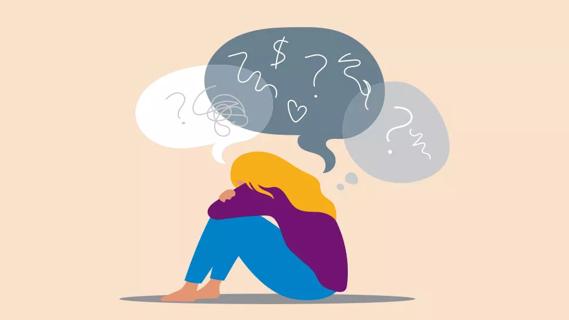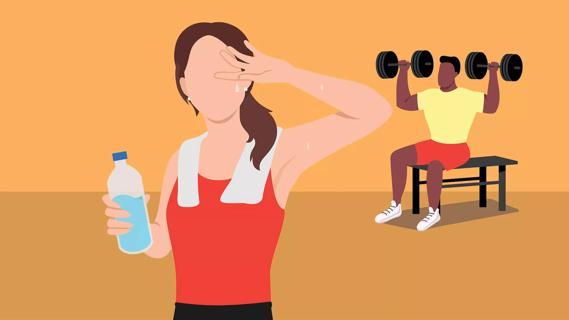It’s possible to have traits from both personality types

It can be a fun icebreaker: Are you an introvert or extrovert?
Advertisement
Cleveland Clinic is a non-profit academic medical center. Advertising on our site helps support our mission. We do not endorse non-Cleveland Clinic products or services. Policy
While we tend to identify with either the introspective introvert or the outgoing extrovert, figuring out where you fall on the personality spectrum isn’t always that simple.
“When we think about introverts and extroverts, a lot of us have preconceived notions,” says health psychologist Grace Tworek, PsyD.
And many of those beliefs aren’t necessarily true. For example, not all introverts are shy or suffer from anxiety. And when it comes to extroverts, not everyone is overbearing or aggressive.
Most importantly, not one personality type is better over the other.
Dr. Tworek explains what sets introverts and extroverts apart and how to figure out where you fall on the personality spectrum.
“An introvert is someone who is more inward-turning,” explains Dr. Tworek. “They feel the most comfortable and thrive in their alone time. They may process things best when they’re alone.”
This gives introverts time to get their thoughts together. They may also like to do things like running errands or getting lunch alone.
Introverts tend to get a bad rep, notes Dr. Tworek.
“They may not be seen as public speakers or are unlikely to speak up in a group setting,” says Dr. Tworek. “But there’s some research that shows we can learn a thing or two from introverts. Their comfortability with quietness and silence can be really good when it comes to managing stress and anxiety.”
Advertisement
Some characteristics of an introvert include:
People, places, things — extroverts tend to draw their energy from the outside world.
“Individuals who are considered an extrovert feel their most comfortable in a group setting. They like to think out loud, problem-solve with others and may even feel more energized around others,” explains Dr. Tworek. “They’re the type of person, who after a day of work, may want to go out to dinner with friends or they want to meet up for drinks.”
Extroverts are often seen as good leaders and they may require less time to make a decision.
“This can be an advantage sometimes, but it can also be seen as a disadvantage at other times,” says Dr. Tworek.
Some characteristics of an introvert include:
“When we think about introverts vs. extroverts, it’s not all that clear-cut in terms of if you’re one or the other,” says Dr. Tworek. “You might have traits of one. But that doesn’t mean all these traits are going to fully apply to you.”
For example, you may have certain qualities at work that are more extroverted, like leading meetings and speaking up, and in your personal life, you might be more introverted and like to spend time alone to recharge and have a close-knit group of friends.
If you have a mix of traits, you could be an ambivert, somewhere in between being an introvert or extrovert. You may excel in social settings and spending time alone. You may also have good active listening skills — engaging in conversation with others while being able to provide a considerate reply.
So, how can you figure out where you fall on the personality spectrum?
While there are plenty of online tests that use a series of questions to determine your personality type, Dr. Tworek says the best place to start is with yourself.
“A really good way to tell is just to do a little bit of introspection,” she suggests. “Start by reflecting on your own experiences and when you’re most comfortable. There’s no right or wrong answer. It’s really about your personal preference, what feels best for you.”
And if you’re having a tough time figuring it out, you can ask those close to you for their observations.
“You can ask them if you’re the type of person who tends to speak up,” Dr. Tworek says. “Feedback from someone you trust and feel comfortable with can give you some insight.”
Advertisement
Yes, if you work at it.
“There are positive qualities that come along with both introverts and extroverts, as well as drawbacks,” states Dr. Tworek.
For example, if you tend to blurt out your opinion before getting a chance to think about it or you rarely speak up with your opinion, you can work on changing how you respond.
“If you typically speak up quickly, take a few moments to formulate your opinion in your head before saying it aloud in a meeting,” advises Dr. Tworek. “And if you’re more likely to stay quiet, try writing down your thoughts in a notebook and then saying it out loud to those around you.”
If you’re not that outgoing in social settings, work on making small talk. Or if you’re always on the go, try to spend an afternoon reading a book and recharging.
Even practicing meditation can help whether you view yourself as an introvert or extrovert. Those moments of silence can lead to reflection and a deeper awareness and even help you learn tools to combat anxiety in social settings.
“It’s all about bringing awareness to those certain traits that you want to change,” says Dr. Tworek. “We can actively work on the positive traits of each personality type to bring out the best of both worlds.”
Advertisement
Learn more about our editorial process.
Advertisement

Too much screen time and unrealistic expectations and perceptions and can lead to an increased risk of anxiety and depression

Although different conditons, they can occur together or cause one another

If the thought of the gym sends you spiraling, do some prep work beforehand and bring a friend along for support

Stay merry and bright by knowing your triggers and journaling throughout your visit

Focus on a positive mindset, strong study habits and healthy living

Breathwork, sleep meditation and avoiding screens can help fight back morning anxiety

This supplement may help with regulating cortisol levels, which may help with stress

Physical, mental and emotional responses are all relevant symptoms

Type 2 diabetes isn’t inevitable with these dietary changes

Applying a hot or cold compress can help with pain